This article was prepared from a series developed by Terry Naauao Panee, Hawaiʻi Village Manager at the Polynesian Cultural Center. Each Hawaiian word showcases the grace and respect of this noble culture. We are proud to support the perpetuation and celebration of the beautiful Hawaiian language.
“A person’s ethnic/national identity is evident through the language he or she uses. If the mother tongue of a people were to disappear, so too would those people disappear.”
(Language Builds Identity and Perpetuates Culture, Kaʻiwakīloumoku – Pacific Indigenous Institute)

Celebrating Hawaiian Language Month
February has been designated by the state of Hawaiʻi as Hawaiian Language Month. It was first established in 2013 when Act 28 was signed by then Governor Neil Abercrombie.
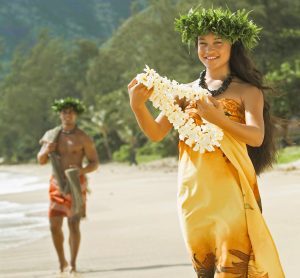
The Hawaiian word “Aloha” reflects a greeting of respect and love
“Aloha”
“Aloha” is our most important Hawaiian cultural value. Without Aloha all the other cultural values are not complete. It is defined as a noun and means love, affection, compassion, charity, grace, empathy, and much more. It can also be a verb that means to love, show affection, give compassion, show charity, and so forth.
Aloha is also used as a greeting and salutation. It doesn’t necessarily mean hello and goodbye, but it is used in the same way that “good evening” can be used to say hello and goodbye. Although it is used as a common greeting today. The proper use of the word is often misused in that many people will try to hold the “o” sound of Aloha longer. Hawaiian is a penultimate language meaning that the second to the last syllable is a natural stress on a word. However, the longer you hold the “O” sound, the less Hawaiian it becomes.
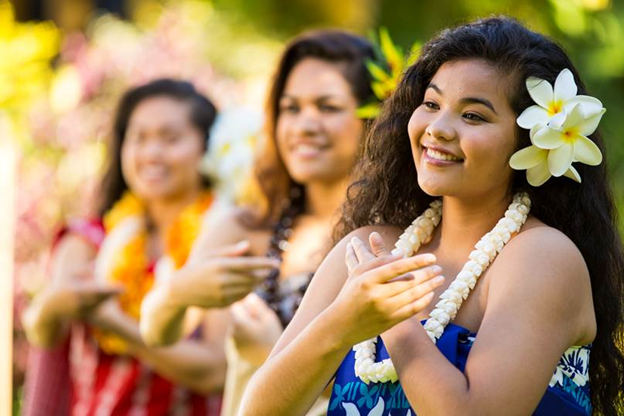
The Hawaiian word “Pono” reflects goodness
“Pono”
“Pono” means goodness, uprightness, morality, correct, proper, right, righteous, just, and virtuous, among others things. Being Pono is a cultural value that we should all strive for. The state motto of Hawaiʻi is “Ua Mau Ke Ea o ka ʻĀina i ka Pono” meaning “The life of the land is perpetuated in righteousness.” It doesnʻt mean that the land is righteous, but that the people need to be righteous for a land to prosper.
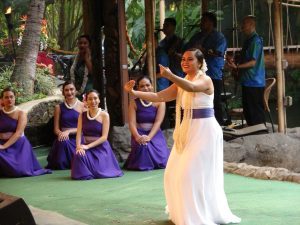
The Hawaiian word “Mahalo” reflects a greeting of respect and love
“Mahalo”
“Mahalo” means thanks and gratitude. Mahalo also means admiration, praise, esteem, regards, and appreciation. It can also mean to admire; to wonder at; to magnify the goodness or virtues of a person or thing. To be glorious; magnificent to behold. To approve; to praise; to honor; to glorify. Wonder; surprise; admiration. Approbation; blessing; honor given to one. Mahalo is another important Hawaiian cultural value that we should strive to emulate. Let us always be Mahalo for the many blessings that we enjoy every day.

The Hawaiian word “Lōkahi” reflects unity
“Lōkahi”
“Lōkahi” meaning unity, agreement, accord, unison, harmony; agreed, and in unity. It can also mean to be alike, to be agreed, to be of one mind, and to be in union or unison. To work together with the same purpose of mind. Having one heart and one mind, allows us to achieve great things.

The Hawaiian word “Laulima” reflects cooperation
“Laulima”
“Laulima” means cooperation, joint action, a group of people working together, community food patch, to work together, and cooperate. Traditionally Laulima was also a name given for a company of men who worked together on each other’s land, or at each other’s work.
When the waʻa kaulua Iosepa was built in 2001, it was an open build, meaning anyone who wanted to help was welcome. The other voyaging canoes built in Hawaiʻi, were all private builds and only certain people were invited to help. These canoes took between 2-5 years, sometimes a lot more to build. Because of the skills of the master carvers and the many hands that helped, Iosepa was completed in just over 8 months. A feat that astonished many people in the canoe building community. It was 9 months to the day, that the first cut was made on the 7 logs, that Iosepa was born, and rolled into the waters at Hukilau beach in Lāʻie bay.
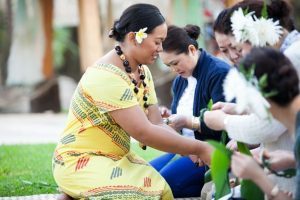
The Hawaiian word “Haʻahaʻa” reflects humility
“Haʻahaʻa”
“Haʻahaʻa” means low, lowly, humble, meek, unpretentious, modest, unassuming, unobtrusive, and humility. This cultural value is often regarded as a weakness in our jobs and other areas of our lives. Society today tells us the we need to tout or boast of our accomplishments and strengths. Yet that is not a cultural value, taught to us by our Kupuna.
In reality, one shouldn’t have to go around bragging about ones’ accomplishments. After all, your good work will become apparent, eventually, in the results of your accomplishments, in how you treat those around you, and how you choose to behave even when you think no one is looking. When you are Haʻahaʻa you don’t need to talk about what you’ve done because others will do it for you without you even knowing it. Hawaiians have a saying: “Kuʻia ka hele a ka naʻau haʻahaʻa” – Hesitant walks the humble hearted (A humble person walks carefully so he will not hurt those about him). Do you know anyone like that?
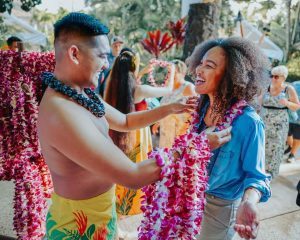
The Hawaiian word “Lei” reflects a handmade garland or wreath
“Ka Lei”
Lei is a simple and short word. It is sometimes mispronounced, but it has a powerful meaning. The definition of a Lei is;
- Lei, garland, wreath; necklace of flowers, leaves, shells, ivory, feathers, or paper, given as a symbol of affection. Beads; any ornament worn around the head or about the neck; to wear a lei; special song presenting a lei; crown; ring around a drake’s neck; yoke, as for joining draft animals, especially oxen. Fig., a beloved child, wife, husband, sweetheart, younger sibling or child, so called because a beloved child was carried on the shoulders, with their legs draped down on both sides of the bearer like a lei.
Lei can be given and worn for any and all reasons. Birthdays, anniversaries, celebrations, graduations, and everyday life. Many people wear lei for work as a part of their uniform or attire. Circular lei symbolizes life and love as it has no beginning and end. Open lei that hangs on both sides of the body and not connected at the ends are often associated with love and pride.
Whatever the material, lei are adornments worn with pride and shared with all to see. Hawaiians often use the term lei figuratively, to represent a beloved child that is shared for all to see. The phrases “He lei ʻāʻī na ke kupuna” and “He lei poʻo na nā mākua” means “A neck lei for the grandparents” and “a head lei for the parents”. Many grandparents and parents love to share photos of their grandchildren and children to anyone who would like to see. Especially if the child or grandchild is very accomplished in whatever they do. So, wear a lei, for whatever reason. Better yet, be a lei to honor your parents and ancestors as well as those who came before you.
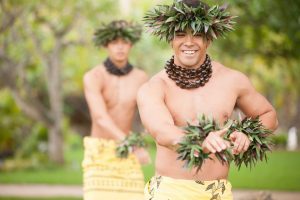
The Hawaiian word “Hoʻolauleʻa” reflects happiness
“Hoʻolauleʻa”
The root of Hoʻolauleʻa is lauleʻa meaning; Peace, happiness, friendship; restoration of a disrupted friendship; happy, glad, genial, courteous, and peaceful. Again “hoʻo” is a causative, and Hoʻolauleʻa means; Celebration, festival, gathering for a celebration, large party; satisfaction; to hold a celebration, to celebrate; to reconcile, restore peace or friendship, appease; to preserve friendship and good will; to be at peace with; to seek to please.
Here in Hawaiʻi we love to celebrate, and any time is a good time to have a party. We celebrate everyone’s culture. There are annual Hoʻolauleʻa celebrations all over the state. The Waikiki Hoʻolauleʻa and the Kamehameha Hoʻolauleʻa are some of the largest events on Oʻahu.
In the fall of 2023, the Polynesian Cultural Center will Hoʻolauleʻa 60 years of sharing our cultures with the world. Ohana (family) will come from all over the world to celebrate with us. Our alumni and supporters will gather together to celebrate, to reconcile and restore peace, friendships, goodwill, and to enjoy each other’s company.
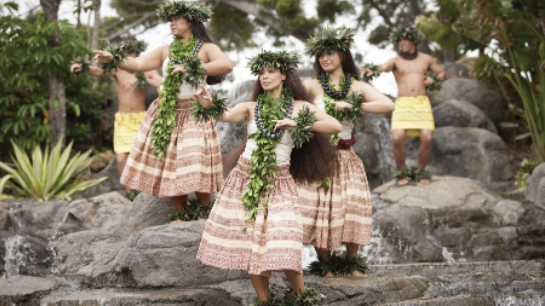
The Hawaiian language is a reflection of love, honor and commitment
CONCLUSION
We hope you enjoyed this in-depth review of some of the many beautiful Hawaiian words which reflects the noble culture of Hawaiʻi, where families are the heart and center of our Hawaiian communities. Mahalo, Terry Panee, for sharing your knowledge and your spirit.

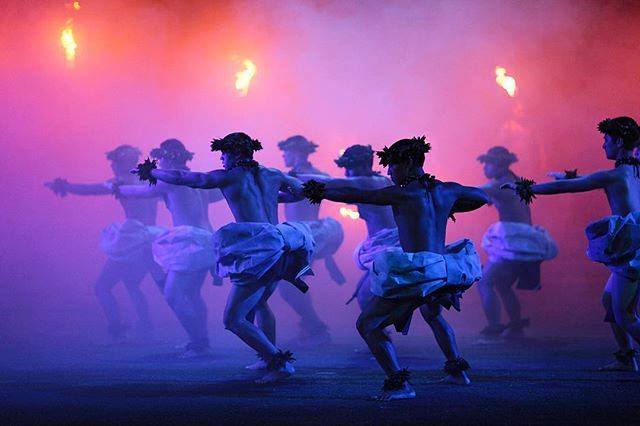
I loved reading about all the special Hawaiian words in the publication but it would have been even more helpful for those of us who are not Hawaiian to have the pronunciation along side of the word.
Great suggestion! I’ll ask for further information from our author for our next segment.
I enjoy this!!!Love the Hawaiian words and culture!!
Mahalo nui for highlighting the word Alooooooha. Yes it is the most mispronounced word. Queen Lili’uokalani was offended when she she was greeted with that & ever since I read about that, it stabs me everytime I hear it. Mahalo no ke kāko’o ka mahina ‘ōlelo Hawai’i